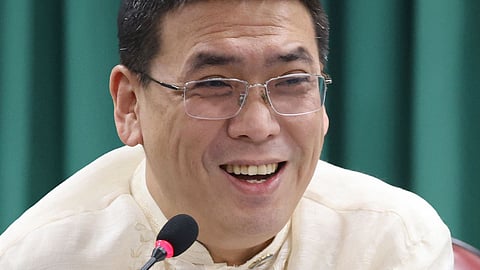
- NEWS
- the EDIT
- COMMENTARY
- BUSINESS
- LIFE
- SHOW
- ACTION
- GLOBAL GOALS
- SNAPS
- DYARYO TIRADA
- MORE

AGRI Partylist Representative Wilbert “Manoy” T. Lee said on Saturday that optimizing the agriculture sector and empowering farmers and fisherfolk are crucial steps toward achieving the Philippines’ nutritional goals outlined in the Philippine Plan of Action for Nutrition (PPAN) 2023-2028. These steps aim to boost the local food supply.
Returning from his engagement as guest speaker at the 3rd Bicolano Young Leaders Congress in Virac, Catanduanes, Lee highlighted the significance of this year's 50th Nutrition Month, underscoring the PPAN's focus on food security as pivotal in addressing nutritional challenges among Filipinos.
He stressed the alignment of these efforts with the Philippine Development Plan’s strategy to enhance productivity and resilience in local agriculture and fisheries, thereby ensuring food security and adequate nutrition.
Lee emphasized, "It is imperative that we fully support and protect our farmers and fisherfolk, our soldiers for food security, to achieve these objectives."
He added, "We are united in our goal to effectively implement the PPAN. Thus, it is crucial that we elevate the agriculture sector because increasing food supply will lower commodity prices and provide access to essential nutrients for more Filipino families."
The PPAN, developed by the National Nutrition Council (NNC), serves as a comprehensive framework guiding government agencies, non-government organizations, academia, and the private sector in coordinated efforts to combat all forms of malnutrition.
The latest iteration of the plan places a strong emphasis on food security, obesity, and improving nutrition behaviors.
Lee reiterated, "It is clear: we can achieve sufficient nutrition when there is sufficient food for all. Aside from creating jobs and increasing income, our priority is the food, nutrition, and health of our fellow Filipinos. When our citizens are healthy and free from illness, we all win."
In line with these objectives, Lee reaffirmed his advocacy by pushing for the passage of House Bill (HB) 3957, also known as the “Kadiwa Agri-Food Terminal Act,” which mandates the establishment of additional Kadiwa centers nationwide. These centers aim to make affordable food products accessible to more consumers by allowing local farmers and fisherfolk to sell their produce directly.
Lee stressed, "When we expand and make Kadiwa centers permanent nationwide, we not only support the livelihoods of our farmers and fisherfolk, but also ensure that our communities have access to affordable and nutritious food."
As a strong advocate for health, Lee also authored HB 2421, the “Nutritional Information Disclosure Act,” which seeks to mandate food service establishments to clearly display nutritional information on their menus. This includes details such as total calories, carbohydrates, saturated fat, protein and sodium content. Such measures aim to empower consumers to make informed choices, promote health awareness, and support individuals managing chronic diseases.
